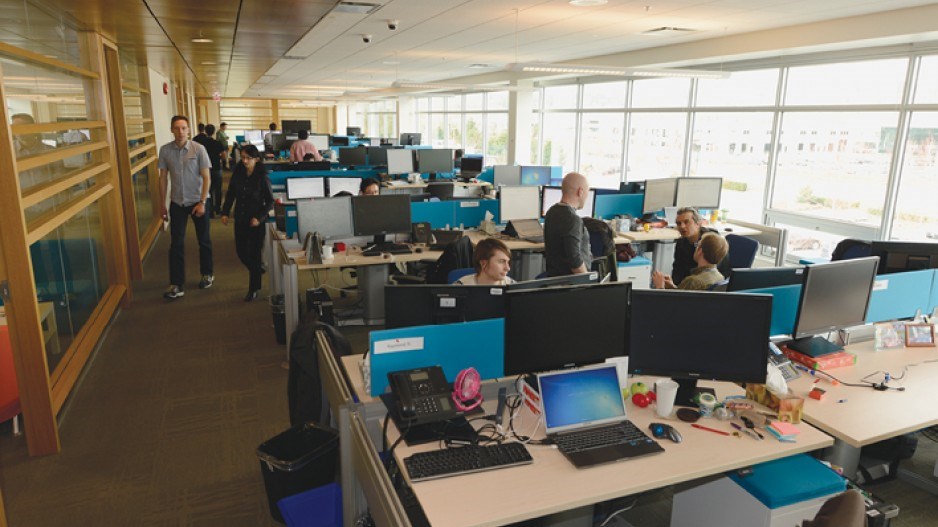Vancouver likes to style itself as Silicon Valley North, and wireless technology accelerator Wavefront has been aggressively promoting machine-to-machine business in B.C.
So when Cisco Systems Inc. (Nasdaq:CSCO) went looking to build a new $100 million Internet of Everything (IoE) innovation centre, why did it choose Toronto, not Vancouver?
Was it proximity to Wall Street? Access to a larger tech talent pool? Or was it the $220 million in subsidies that the Ontario government offered?
Cisco recently announced it will invest $100 million in a new 15,000-square-foot innovation centre in the new RBC WaterPark Place in Toronto. It will also be the company’s new Canadian headquarters.
Wavefront CEO James Maynard doesn’t take the move as a slight against Vancouver.
“Cisco is in the business of selling to large corporations,” he said. “And their target customers – insurance, banking – Toronto has the largest number of head offices in Canada. Demographically, I can understand why they made the decision.”
Vancouver has attracted some big players in high tech, including Samsung and Amazon.com (Nasdaq:AMZN), but the development centres they are opening here are not on the scale of Cisco’s IoE centre in Toronto.
The IoE centre is part of a 10-year plan to invest $4 billion in expanding the company’s existing footprint in Ontario – an investment the company said would create up to 1,700 new jobs.
With the investment following an exodus of console games studios like Ubisoft Entertainment in recent years, Vancouver’s tech community may wonder if B.C. is losing its competitive edge to Quebec and Ontario, which have been aggressively courting high-tech companies with tax incentives.
In 2012, Ubisoft closed its Vancouver studio and opened a studio in Toronto. Ubisoft has agreed to create 800 new jobs in Toronto by 2020 in exchange for $260 million in tax credits from the Ontario government.
“B.C. has lost several studios to closures and missed most of the large new investments in video game studios,” said Howard Donaldson, president of DigiBC, which represents B.C.’s gaming, animation, visual effects and digital media sectors.
“These investments have gone to Quebec, mostly. We are competing with cities that offer large labour pools, excellent universities, supportive government and great tax incentives. B.C. also has these attributes, but the tax incentives are much lower.”
In addition to massive provincial tax incentives, the City of Toronto offers the Imagination, Manufacturing, Innovation and Technology (IMIT) program for targeted sectors like high-tech and manufacturing.
When a company within a targeted sector invests in a new building or redevelops an old one, the IMIT covers a large portion of any increased property taxes through graduated rebates. A company whose property taxes rise to $100,000 through a redevelopment, for example, would get $80,000 back in the first year, and would pay the full amount only in the 10th year.
Apart from promoting Vancouver’s three Ts (talent, time zone and taxes), the Vancouver Economic Commission has no similar types of incentives for attracting or retaining high-tech companies.
In fact, the city took some heat when it offered HootSuite – one of Canada’s fastest-growing high tech companies – a lease and option to buy city-owned property in Mount Pleasant at below market rate.
Because Cisco makes computer networking hardware, it makes some sense for the company to be in Ontario, where there is more manufacturing and where Nortel Networks Corp.’s bankruptcy and BlackBerry Ltd.’s (TSX:BB) downsizing have made more workers with wireless hardware engineering skills available.
Bill Tam, CEO of the BC Technology Industry Association, said Vancouver’s high-tech sector has traditionally been more software- and Internet-based.
“For Facebook (Nasdaq:FB) or Amazon or any number of those companies, the question as to why they located here in Vancouver has probably got nothing to do with tax credits and more about the local ecosystem.”
Though not on the scale of the Cisco deal, Vancouver continues to attract international companies, many of which have opened development offices and research centres here.
The most recent was Freelancer.com, an Australian Internet company, which is now hiring for its new Vancouver engineering lab.
Local talent, not subsidies, brought Samsung to B.C.
In November 2013, Samsung Electronics announced it had opened a new research and development centre in Burnaby.
The announcement followed the news one month earlier that Amazon.com Inc. (Nasdaq:AMZN) reportedly planned to take 91,000 square feet in the new Telus Gardens building. Amazon has yet to confirm the move here but currently has 103 jobs listed on its jobs board for Vancouver.
Microsoft Corp. (Nasdaq:MSFT) also has a presence in Vancouver and is hiring more than 20 software engineers, mostly for its two games studios: Black Tusk and BigPark.
It appears Vancouver’s tech talent, not government subsidies, was the reason for Samsung’s decision to locate the new development centre here.
“Canada has a skilled and talented workforce and is home to some incredible tech innovation,” said Tom Nyberg, senior director and general manager for Samsung’s new Vancouver Enterprise Lab.
“Samsung has invested heavily in R and D, globally spending [US]$10.8 billion on the development of future technologies, and it was time to bring these investments to Canada. British Columbia specifically is a hub for innovation in Canada, with an immense talent base to draw from.”
Engineers at the new Burnaby centre are developing security technology for the company's enterprise electronics.




